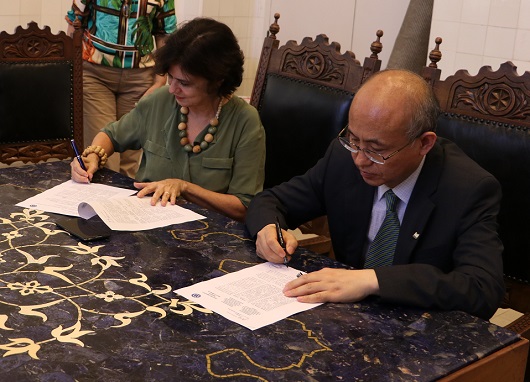The Chinese Academy of Sciences and Fiocruz sign a cooperation term
16/10/2018
Julia Dias
Fiocruz president, Nísia Trindade Lima, and The Chinese Academy of Sciences (CAS) vice-president, Zhang Yaping, have signed a Memorandum of Understanding (MoU) at Fiocruz headquarters, last Wednesday, September 26th. The MoU is the third memorandum entered into between Fiocruz and Chinese scientific institutions, and represents another step in cooperation between these two developing countries. The first document was signed in November 2017 by Fiocruz and the Chinese Center for Diseases Control and Prevention (CDC China), and the second one was signed in February 2018 by the Foundation and four Chinese institutions.

Photo: Peter Ilicciev
This is the first MoU entered into directly with the Chinese Academy of Sciences and is intended to foster the exchange of scientists and data, as well as research projects, scientific events and co-authored papers.
"This is the third memorandum signed by the president together with the Chinese Academy of Sciences. The two previous ones were entered into with specific institutions and organizations, we have now created an understanding to interact with all of the 120 institutes of this organization", said Carlos Morel, director of the Center for Health Technological Development (CDTS/Fiocruz), who leads the initiative.
CAS is China's largest scientific institution and, differently from other academies of sciences, it has its own facilities and labs. Responsible for a large share of the country's science infrastructure, the Academy coordinates 124 institutions, 104 of which are research institutes and 5 are universities. Additionally, CAS has seven labs outside China. These labs include the South American Astronomy Center, in Chile, and the China-Brazil Joint Lab for Spatial Climate, in Brazil. The Academy also has mega-science facilities, with a five-hundred-meter aperture spherical telescope. The Academy has made important discoveries, like mapping zika virus structure.
"This partnership is especially important because of the strategic role played by both institutions", said Fiocruz president during the memorandum signature ceremony.
CAS vice-president was also happy with the partnership and impressed with Fiocruz history and facilities. "By signing this MoU, we reinforce our collaboration which still has great potential to grow and support public health in both countries".
On the following day after having visited Fiocruz, CAS entourage gathered with members of the Brazilian Academy of Sciences (ABC) at the headquarters of the institution to enter into another partnership. ABC is now part of an international network of centers linked to CAS Center of Excellence for Emerging Diseases and The World Academy of Sciences (TWAS). The network has centers in South America, the African Union, Central Asia and Southeast Asia, and is focused on disease prevention, with ground-breaking research in developing countries. Fiocruz was also invited to join the network.
"The idea is to strengthen our international cooperation efforts also through TWAS, whose Brazilian office is located in Rio and whose partnership with CAS is extremely successful", explains Morel.


